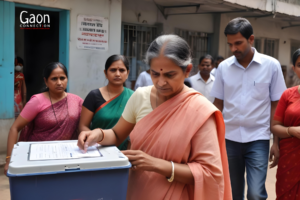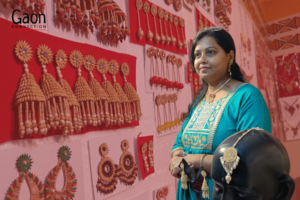A sea of anganwadi workers and helpers, holding red flags, descended outside the residence of Chief Minister Arvind Kejriwal in New Delhi today, January 31, as they launched their indefinite strike. These women workers, who are the backbone of the country’s early childhood care programme, have been demanding, among other things, a raised honorarium and the status of a government employee.
The protesting workers said that despite announcements and assurances by both the central and the state governments, they are yet to receive their rightful dues.
Hundreds of anganwadi workers in Delhi have gone on an indefinite strike from today. Protesting near CM @ArvindKejriwal's residence, they claim they're yet to receive the honorarium increment announced in 2018. Meanwhile, they are loaded with additional duties.
— Gaon Connection English (@GaonConnectionE) January 31, 2022
📹Sarah Khan pic.twitter.com/wTp8P2sbzy
“Anganwadi workers are detailed to collect all kinds of data relating to caste, newborns, pregnant women… No top level officer is going to come down and do the dirty work of data collection, and yet our monthly honorarium is merely Rs 9,678 and helpers are paid Rs 4,839,” Rajni Sahni, an anganwadi worker, told Gaon Connection.
“We want status of a government employee because we are the backbone of the country,” she added.
According to the Delhi State Anganwadi Workers and Helpers Union, the honorarium in Delhi was last increased in August 2017 after 58 days of strike. “The last announcement for increment from the Central Government was made on September 11, 2018. This announcement proved to be a jumla and we have not received the declared amount till date. On the contrary, after this instance, the Kejriwal government of Delhi issued a notification in September 2019, deducting Rs 900 and Rs 450 respectively from its share in the honorarium of workers and assistants,” reads the union’s statement.
“We don’t want charity, we want the status of a government employee. In 2018, PM Modi had announced that from October 1, anganwadi workers will be paid Rs 1500 extra and helpers will be paid an extra Rs 750. We haven’t received that yet,” said Sahni, a member of the Delhi State Anganwadi Workers and Helpers Union. “And then, Kejriwal reduced our honorarium while our word load has increased in the pandemic,” she added.
This isn’t the first time that these anganwadi workers and helpers have launched a protest. Exasperated with their meagre salary and increasing workload, in September 2021, thousands of anganwadi workers in the national capital took to the streets.
Also Read: UP govt hikes honorarium for anganwadi workers, but they call it an eyewash
A delegation of anganwadi workers had met Delhi’s women and child development minister, Rajendra Pal Gautam who had assured that their demands would be addressed within a week. However, four months have elapsed since then and nothing has materialised so far, said the protesting workers.
Meanwhile, a day-long strike was organised on January 6 this year but on account of the COVID 19 third wave alert, the union members didn’t continue the strike after January 6.
But, today, January 31, hundreds of anganwadi workers gathered outside the residence of Chief Minister Kejriwal, renewing their demand of an increase in their honorarium, and according them a status of a government employee.
“I started working when I was young and I will soon retire. We worked through the COVID pandemic without a thought for our own safety or that of our families, and this is how the government acknowledges our efforts. Shouldn’t I be eligible for a pension,” Nirmal Sharma, a 59-year old anganwadi worker due to retire in December this year, asked Gaon Connection.
“We demand a salary and status of a government employee”
Jeetin, who works at the Nangloi anganwadi centre, was disgruntled too. The 33-year-old told Gaon Connection, “They (the government) treat us as if we are their salaried employees. Our work has increased but the honorarium hasn’t increased at all. The last time any attention was paid to was in 2017,” she said.
In 2017, then anganwadi workers protested for 58 days to demand an increase in their honorarium.
As per a statement issued by Delhi State Anganwadi Workers and Helpers Union (DSAWHU), Delhi government, in its notification issued yesterday on January 30, had decided to increase the working days of women workers in anganwadi centres and to use their services at the Saheli Coordination Centre.
“On the one hand, the Delhi government is talking about women empowerment, while on the other, women workers working in important schemes like Integrated Child Development Project, far from receiving minimum wages, have not even acquired the status of ’employee’,” the statement read.
“The government says that they’re doing a lot for women. They’re doing nothing. We have put forth our demands through our union and we won’t budge until they’re accepted,” Jeetin told Gaon Connection.
“Have family to support, children’s fees to pay”
“We have to pay for our children’s fees, ration, travel expenses, etc. Our country is developing and digitising but our honorarium is still the same. We can’t even call it a salary,” Sahni pointed out.
“We went from door to door during covid to distribute rations. Many of our workers died due to covid and their families got no compensation. There’s not even a provision to provide jobs to other women members of the family, once an anganwadi worker dies. There’s no promotion of women who have been working here for long,” Chitralekha, an anganwadi worker from Mandoli, told Gaon Connection.
Many workers also complained that they were not provided with any sanitizers, masks or kits during the pandemic. “Every worker has close to 1,000-1,500 people to oversee. They went around distributing ration but they had no safety gear given to them by the government. Many times we came in contact with people who were COVID-19 positive but despite that, we weren’t provided with any protection,” Sahni added.
Irregularities with the POSHAN tracker app
The POSHAN tracker app, which was launched in 2018 as a governance tool for real-time monitoring of nutritional outcomes was another contentious matter. Many anganwadi workers pointed out that the app was riddled with problems.
“Whatever ration we distribute needs to be updated on the app but the problem is that it never works during the working hours and can only be operated at odd hours like 7 or 8 in the morning or after 10 at night. We have to put in extra hours to upload the data but we aren’t compensated for those extra hours,” anganwadi worker Shashi Yadav told Gaon Connection,
Many of the senior anganwadi workers like Nirmal Sharma who will soon retire, complained that they were given no proper training on how to use the POSHAN app. “I struggled a lot in the initial days. I learnt to operate it with the help of my colleagues. I still encounter problems with it,” Sharma said.

















